Duke University School of Nursing has centered its mission on not only providing an excellent education for future nursing leaders but also to creating a center of excellence for advancing nursing science.
As the field of Oncology nursing has expanded its role, DUSON is proud to have played its part in helping to educate a future generation of oncology nurses while also leading nursing science in oncology research.
Responding to an early national need to educate nurses in the specialized field of oncology, DUSON was one of the first nursing schools to create an Oncology Specialty and remains one of only a handful of schools today with this curriculum. The DUSON MSN Oncology Specialty prepares advanced practice nurses with a strong knowledge base in cancer epidemiology, pathophysiology, immunology, genetics, prevention, symptom management and end-of-life care.
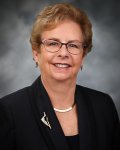 “DUSON is unique in that we have several faculty members with specialties in oncology,” says Sue Schneider, PhD, RN, AOCN, ANCS-BC, FAAN, associate professor and faculty lead for the graduate oncology specialty and recent President of the Oncology Nurses Society. “Many of our faculty members with oncology expertise work with students on various projects and mentor them throughout the duration of the specialty.”
“DUSON is unique in that we have several faculty members with specialties in oncology,” says Sue Schneider, PhD, RN, AOCN, ANCS-BC, FAAN, associate professor and faculty lead for the graduate oncology specialty and recent President of the Oncology Nurses Society. “Many of our faculty members with oncology expertise work with students on various projects and mentor them throughout the duration of the specialty.”
Schneider was recently appointed to the Biden Cancer Initiative board of directors alongside other experts in health care, business, finance and technology. The Initiative works closely with patients and patient organizations, cancer researchers, cancer centers, research universities, governments and the private and philanthropic sectors to identify and address the critical issues in cancer prevention, research and care to drive new actions and collaborations toward ending cancer as we know it today.
The oncology specialty is tailored for oncology certified nurses who have the knowledge to care for adult oncology patients and the curriculum includes two didactic courses and one clinical course sequenced to address advanced oncology care integrated within the MSN or DNP education.
While enrolled in the Oncology Specialty, students can access the vast resources available not only at Duke University, but also at the Duke University Health System and the Duke Cancer Center.
“If students are interested, they have options for clinical placements right here at Duke,” says Schneider. “However, if students are not local to Durham, through faculty connections and our extensive preceptor program, we have the ability to place students in clinical settings around the country.”
Once students complete the specialty coursework and required clinical hours, they are prepared to practice as Oncology Nurse Practitioners in a variety of cancer care settings around the nation. Once they have established themselves in practice and gained additional clinical experience, DUSON graduates are qualified to sit for the Advanced Oncology Certified Nurse Practitioner exam “I can confidently say that anyone who’s interested in an Oncology Nurse Practitioner position who has completed our specialty could have a job in their field within six months,” says Schneider.
Leading Nursing Science in Oncology Care
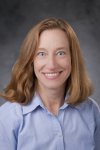 Cheryl Rodgers, PhD, RN, CPNP, CPON, associate professor, conducts research focused on children and adolescents undergoing cancer treatment within three areas of symptom science—symptom assessment, symptom management and symptom influences.
Cheryl Rodgers, PhD, RN, CPNP, CPON, associate professor, conducts research focused on children and adolescents undergoing cancer treatment within three areas of symptom science—symptom assessment, symptom management and symptom influences.
The information generated through Rodgers’ research can allow nurses to perform more comprehensive symptom assessments throughout the cancer treatment and recovery phase and encourage more meaningful discussions and the use of coping strategies for symptom management by their patients. “DUSON supports me so I can concentrate my efforts on my program of research,” says Rodgers. “The school has experienced leaders in this field of cancer research who provide valuable mentorship to me and other faculty.”
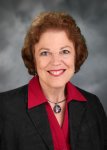 Sophia Smith, PhD, MSW, associate professor and two-time cancer survivor, conducts research focused on innovative mHealth and psychosocial care solutions to improve health outcomes for cancer survivors.
Sophia Smith, PhD, MSW, associate professor and two-time cancer survivor, conducts research focused on innovative mHealth and psychosocial care solutions to improve health outcomes for cancer survivors.
After being diagnosed as a teenager with Hodgkin lymphoma and again as a new mother in her 30s with breast cancer, Smith has used her personal experiences with cancer, as well as her skills as a research scientist and social worker, to help guide her course in oncology research.
Smith focuses her research on PTSD symptoms of cancer patients and has created a Cancer Distress app entitled “Cancer Distress Coach” that supports cancer patients by allowing them to gain coping skills, manage their stress and build a network of support. Visit http://dukecancerinstitute.org/distresscoach to learn more and download her Cancer Distress Coach app.
In addition to her Cancer Distress Coach, Smith is also conducting a study focusing on the metastatic breast cancer community. Her study, The Four Conversations program, is an online program assisting with decision making and care planning for those with advanced disease. Learn more about The Four Conversations program here.
“Being affiliated with DUSON affords me the opportunity to work in interdisciplinary teams with the Duke Cancer Institute,” says Smith. “DUSON values research and makes it a priority in the School.”
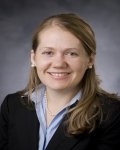 Devon Noonan, PhD, MPH, FNP-BC, associate professor, was inspired to focus her research on the prevention of cancer by Janie Heath, PhD, APRN-BC, FAAN, her mentor in graduate school, who focused on educating students about the benefits of promoting smoking cessation.
Devon Noonan, PhD, MPH, FNP-BC, associate professor, was inspired to focus her research on the prevention of cancer by Janie Heath, PhD, APRN-BC, FAAN, her mentor in graduate school, who focused on educating students about the benefits of promoting smoking cessation.
Noonan’s research focuses on reducing individual’s risk for cancer by encouraging smoking cessation, addressing their lifestyle, promoting health eating habits, promoting increased physical activity and encouraging early screenings for cancer. The earlier an individual can quit smoking, the better their quality of life and health outcomes will be. Once an individual has quit smoking, their chances of developing cancer caused by smoking dramatically decreases as does their chances of developing secondary cancers.
“A lot of my research is done with interdisciplinary teams through the Duke Cancer Center,” says Noonan. “DUSON really supports its faculty participating in these types of interdisciplinary research efforts.”
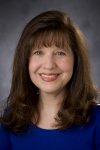 Mary Lou Affronti, DNP, MHSc, RN, ANP, associate professor, focuses her research on improving treatment and outcomes in patients diagnosed with brain tumors and is the co-director of the supportive care program at Duke’s Preston Robert Tisch Brain Tumor Center. As a practicing nurse practitioner scientist, she leads her multi-disciplinary research team in the development and implementation of clinical protocols and practice improvement projects to improve symptoms and quality of life for her patients.
Mary Lou Affronti, DNP, MHSc, RN, ANP, associate professor, focuses her research on improving treatment and outcomes in patients diagnosed with brain tumors and is the co-director of the supportive care program at Duke’s Preston Robert Tisch Brain Tumor Center. As a practicing nurse practitioner scientist, she leads her multi-disciplinary research team in the development and implementation of clinical protocols and practice improvement projects to improve symptoms and quality of life for her patients.
“Early in my oncology nursing career, I became interested in symptom management, understanding that poorly controlled treatment-related side effects like nausea and vomiting decrease a patient’s quality of life and deplete patient resources, compromise compliance and lead to decreased treatment efficacy and quality of life,” says Affronti.
Affronti was inspired to focus her career on oncology research through her early experience as an advance practice nurse managing oncology symptoms and through the guidance from mentors including her father Dr. Lewis Francis Affronti Sr., Dr. Florence Siebert, Dr. William Peters, Dr. James Vredenburgh, Dr. Henry Friedman, Dr. Jeremy Rich, Dr. Mary Champagne, Dr. Sue Schneider and Dean Marion E. Broome.
As a Duke-educated nurse—MSN ’86, ANP certification ’94, MHSc ’09, DNP ’13—Affronti feels that DUSON creates an environment for incredible research collegiality and mentorship that cultivates collaborative projects.